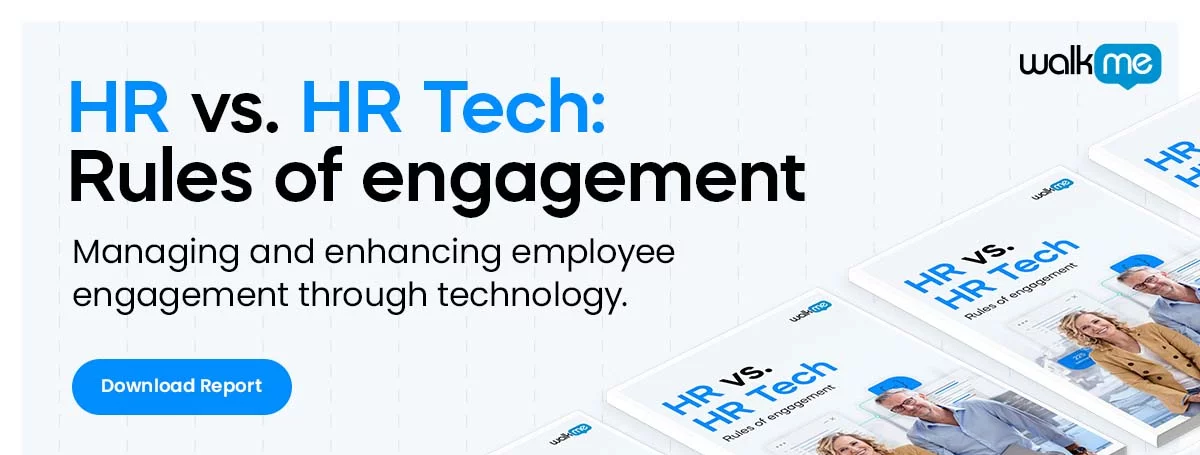
What Is An Employee Value Proposition?
A company’s EVP, or Employer Value Proposition, describes the attractions and benefits it offers prospective employees. In other words, it’s what an employer can offer an employee.
It outlines the reasons why people would want to work for a particular business and sets expectations for what employees can achieve if they meet company values.
An EVP encompasses pay, benefits, perks, training, rewards, and the intangible emotions of a workplace, like company culture, values, and mission.
It should be everything an employee can expect when working for you, as it establishes a standard contract that outlines the roles and benefits while establishing an emotional connection between employer and employee.
Why Is An Employee Value Proposition (EVP) So Important For Tech Businesses?
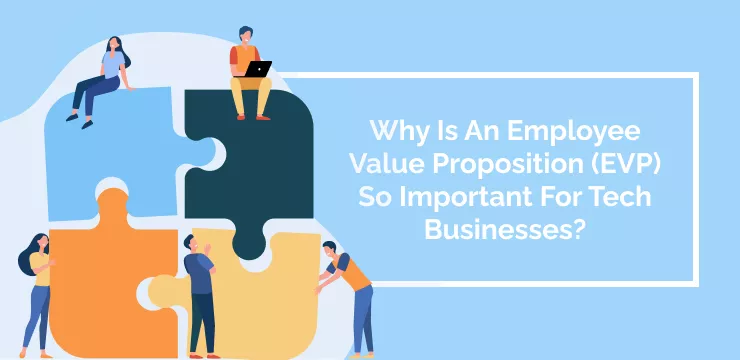
A recent report by Gartner states the EVP for the post pandemic workforce must orient toward employees as people, not workers; provide an exceptional life, not work, experience; and focus on the feelings, not just the features that match employee needs.
There are several factors why your EVP is such an essential part of your recruiting strategy. It will naturally attract only those who feel well-aligned if it is appropriately designed. Use your EVP to set yourself apart from others in your industry, highlighting what makes you unique and attractive as an employer.
Gartner’s Human Resources Insights reveals that focusing on your company’s Employer Value Proposition will decrease annual employee turnover rates by up to 70%. New hires will also be more committed, with a 20% rise in these numbers.
It’s not just about what you’re offering regarding employee benefits but how they are communicated. Your EVP should be present across all employee touchpoints, from your website to job postings and the onboarding process. If not, you’re likely to see a disconnect between what prospective employees expect and what existing employees they experience.
Developing A Modern & Cohesive EVP
The digital transformation places new demands on technology businesses and their employee value propositions. As companies strive to remain agile in the face of disruptive new technologies, they need to ensure that their EVPs are fit for purpose.
An employee value proposition that’s fit for the digital age needs to be able to attract and retain the best digital talent. This means considering not just the financial rewards on offer but also the development opportunities and work/life balance that employees are looking for.
A recent study by Deloitte found that employee experience is now the number one priority for business leaders. To remain competitive, businesses must focus on creating a positive employee experience at every stage of the employee lifecycle.
This means ensuring that your EVP is communicated effectively and consistently across all channels with appropriate employer branding. It’s also important to review it regularly to ensure that it’s still relevant and meets the needs of your employees.
If you’re looking to scale your tech business, you must ensure a strong employee value proposition. By taking the time to create an EVP that’s fit for the digital age, you’ll be able to attract and retain the best talent. In turn, this will help you to achieve your business goals.
How Does An Employee Value Proposition Help Scale Tech Businesses?
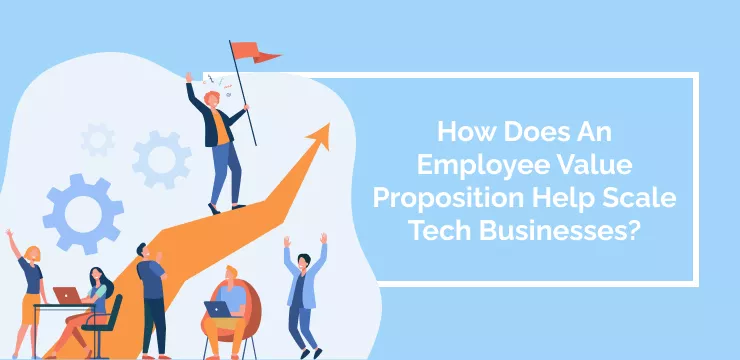
Technology businesses are under pressure like never before to scale up quickly and efficiently. The right employee value proposition will help you do just that. By understanding the needs of your target employee, you can better assess what they’re looking for in a company and what will make them want to stay with you long-term.
Developing your own employee value proposition (EVP) is also a great way to build employee engagement and increase employee retention. By establishing a clear and concise set of expectations and benefits, you can ensure that everyone in your company is on the same page and knows exactly what they’re working towards.
When scaling a tech business, an employee value proposition should be at the forefront of your mind. It’s essential for attracting and retaining the best talent and will help you build a strong foundation for employee productivity and company growth.
The Four Step Guide To Creating A Winning Employee Value Proposition In Tech
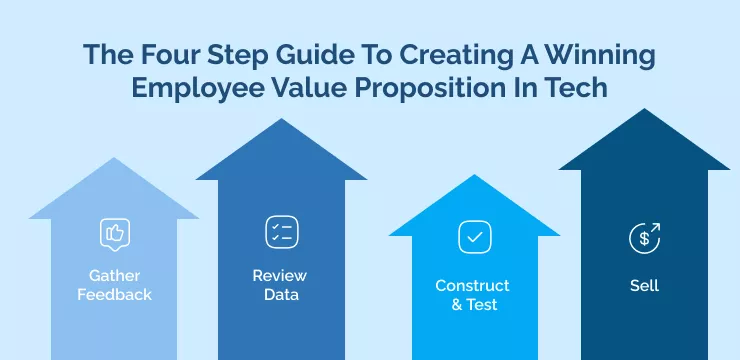
Defining your EVP is more than a marketing exercise; it needs real thought about what you provide. This entails gathering input from numerous people, analyzing the data, and then carefully crafting your message.
Hiring a professional technology and digital recruitment agency can be highly beneficial, as they are experts in the field with deep industry and candidate insights. They can help you expertly define what makes your company so unique, saving you time and energy in the long run.
The process usually looks something like this:
- Gather Feedback
The key to creating an excellent employee value proposition is understanding what current employees appreciate about your company and why they remain with you.
Some questions you may want to consider are:
- What makes our company an attractive place to work for potential employees?
- What makes working for you an attractive proposition to current employees?
- What makes you stand out from the crowd in their eyes?
- Why do they continue to stay?
- Why do employees leave?
- What was the most effective technique you used to keep your existing clients?
There are many ways to gather information about your company’s recruitment efforts. You can speak to employees directly through anonymous surveys and previous job applicants. Your recruitment agency can also help you get feedback from candidates who have applied for roles in your company.
- Review Data
You may use the above to discover what tangible and intangible benefits your staff value most. It could be your hybrid working style, opportunities to upskill regularly, or your dedication to developing strong team connections.
After you’ve compiled the data, you should be able to identify your key selling points and the corporate values that employees care about most. This can serve as a starting point for creating your EVP.
- Construct & Test
Our advice is that you simplify your EVP into a concise message which quickly demonstrates to potential employees what they would appreciate about working at your organization and why they should consider applying.
Examples of EVPs that are well-written:
- Google: “Build for everyone.”
- SAP: “Bring Everything You Are. Become Everything You Want.”
- Merck: “Invest. Impact. Inspire. A continuous cycle of invention, making an impact and using that to inspire internally and externally.”
After brainstorming a few ideas, evaluate whether they:
- Align with your company’s core values, vision, and mission
- Help you stand out from others in the same field
- Give your audience a sense of what it’s like to work at your organization.
- Interesting and inspiring.
Would testing your EVP with internal employees and an external focus group make sense? Ask them if the statement accurately represents why someone should work with you.
4. Sell
Your EVP should be constantly included throughout your company, both externally in recruitment resources and platforms like your website, social media, and professional networking profiles. Additionally, it should show up internally on things like employee onboarding documents, company communications, strategic planning, and employee reward/recognition programs.
Your employees may just be the most convincing proof of your Employee Value Proposition. After all, who would know better than them what makes working at your company great?
You can showcase this through employee videos, testimonials, blogs, or even LinkedIn posts. Utilizing these voices will hold more power than the words you say in an interview because it comes from those with first-hand experience.
Strategic Employee Value Propositions
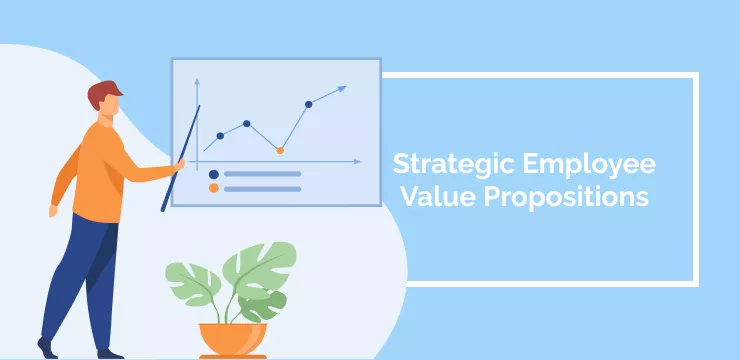
As we’ve seen, an EVP can assist in differentiating your employer brand and providing tangible, relatable touchpoints for your candidate personas. But how do you make sure that your EVP is compelling?
We briefly discussed some methods earlier (for example, customizing your EVP to appeal to your employee personas), but now let’s explore this topic in greater detail.
To begin, you’ll want to audit your current offerings to catalog every way you provide value to employees.
Employee Value Proposition Examples:
- Salary – Perks, research funds, and other benefits are examples of non-cash compensation.
- People – The opportunity to collaborate with a high-quality team, as well as chances for mentorship or learning from more experienced coworkers.
- Growth – Chances for career advancement and the development of new skills.
- Job Satisfaction – The chance to tackle tough challenges, the promise of a healthy work-life balance, or any other “intangibles” that motivate individuals to show up and contribute daily.
Of course, there are other ways to add value, but these should get you started. Now it’s time to list the candidate personas you use in your hiring process and see how you add value to match up with different personas. Consider their goals, motivations, and priorities when making your decisions.
In this manner, you may link your communications and audience more explicitly, allowing you to categorize better and strengthen your employer’s brand messaging. This can be a significant added value for IT firms attempting to win the war for talent, suggesting that you are a desirable workplace.
Things To Consider When Developing An EVP
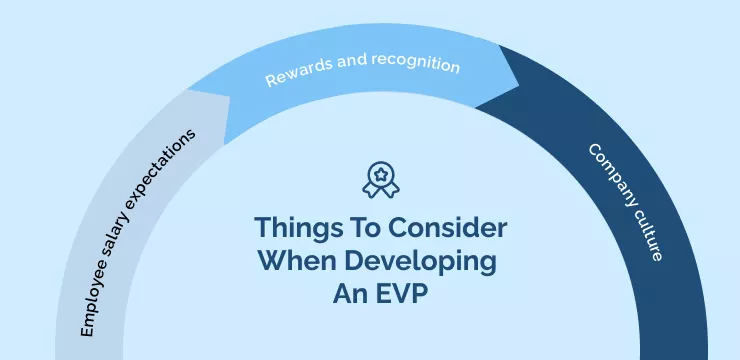
There are a few aspects to consider while creating your EVP… To begin, speak with current employees about why they enjoy working for your firm.
Launching an anonymous employee survey is a great way to get feedback on what you’re doing well. After all, there’s no sense starting from scratch when you could be sitting on some fantastic practices that your employees and candidates love!
Could it be because you promote employee career development? Perhaps you advocate an outstanding work-life balance with flexible working conditions. It might also be worth including questions on this survey that reveal what your business doesn’t do well and where current employees feel you could work.
Creating an employee value proposition can be difficult, but there are some key factors to keep in mind:
Employee salary expectations
Salary is one of the key factors for any new role – people have bills to pay, mouths to feed, and the latest trainers to buy. A big no-no when building out your EVP is inflating salaries because of enormous competition.
You can’t compete for talent solely based on financial compensation. Using any money you set aside for new hires is also easy. Salary no longer becomes the primary concern when considering other components of the EVP. On the other hand, you don’t want to undervalue potential employees.
HR’s biggest mistake is not keeping track of employees’ real talents, growth, and learning. You risk underpaying your staff if you lose sight of them. This will cause them to believe they are undervalued and seek other opportunities elsewhere.
You should check employee salaries against industry standards at least once a year to ensure they are paid fairly.
Rewards and recognition
According to recent research conducted by Seek, job candidates consider various factors when deciding whether or not to accept an offer. Reward and recognition, employment benefits, and all the perks associated with a role are just a few examples of what they look for in a potential employer.
In other words, top prospects are concerned about the whole compensation package rather than simply the money part.
Rewards and recognition, or employee benefits, come in three forms:
- Additional compensation – free coffee, health insurance, gym memberships, flexible working, and company-sponsored holidays (the list is endless, just budget-dependent).
- Values, mission, and purpose – making them feel like their job matters is crucial to boosting employee engagement.
- People and culture – Great people, want to work with great people, and creating a positive work environment is a surefire way to make people feel excited about coming to work every day.
Company culture
Candidates don’t just want to know what they’ll be doing day-to-day if they take the job but also what the workplace environment is like. This factors into your organization’s “employee value proposition” (EVP).
If you frequently host staff events or activities, perks like employee incentive schemes, rewards, and competitions that employees might be interested in should be showcased from the beginning.
Industry 4.0: The Future Of EVPs
Industry 4.0 is set to affect the future of employee value propositions in a major way. It will enable companies to offer more personalized, engaging, and productive work environments that attract and retain top talent.
The future employee value proposition will be driven by Industry 4.0. Companies that embrace the fourth industrial revolution will be able to offer more personalized, engaging, and productive work environments that attract and retain top talent. However, Industry 4.0 will also present new challenges for HR teams, who will need to upskill their employees to meet the demands of the fourth industrial revolution.
This means that the future employee value proposition will be about more than just salary and benefits. It will also be about offering employees the opportunity to learn new skills, work in a collaborative environment, and impact the company’s success.
WalkMe Team
WalkMe spearheaded the Digital Adoption Platform (DAP) for associations to use the maximum capacity of their advanced resources. Utilizing man-made consciousness, AI, and context-oriented direction, WalkMe adds a powerful UI layer to raise the computerized proficiency, everything being equal.
